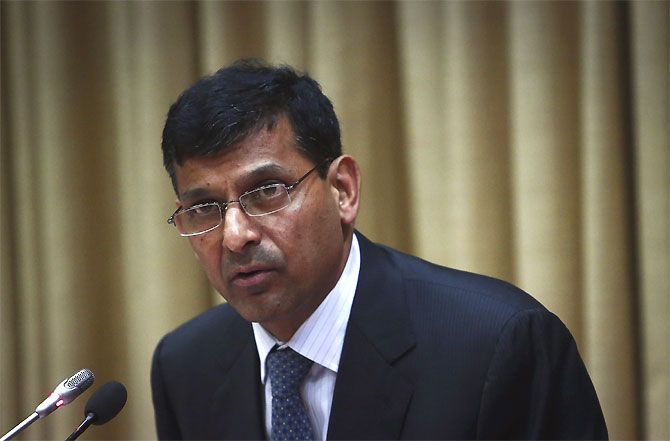
India’s political class should shed its fascination for foreign-bred, foreign-trained and foreign-brainwashed promoters of exotic prescriptions, and appoint for positions critical to the nation’s well-being out-of-the-box thinkers rooted in the country’s ethos who would be in tune with the country’s imperatives, says B S Raghavan.
I have had only two encounters with Raghuram Rajan, currently governor of the Reserve Bank of India. The first was in 2004 when, as the chief economic adviser on the staff of the International Monetary Fund, he came to Chennai and gave a talk on what was right and wrong with India's economic management.
The sponsors of the meeting gave me the exclusive role to critique the talk on the spot. Rajan had mostly canvassed for solutions traceable to the Washington Consensus, including full capital account convertibility, and I had to urge him to look at Indian problems through Indian eyes and not to import recipes inappropriate to India's context which was sui generis.
My comments elicited repeated rounds of loud applause which could not have pleased him.
The second was on May 22, 2015 when, as the RBI governor, he delivered the sixth President R Venkataraman's Endowment lecture on ‘India and International Financial System’ at the Madras School of Economics. I admit I went to the lecture with very high expectations, for between the last and present occasions Rajan had grown larger than life, with tremendous global build-up, and several prestigious awards under his belt.
He had been particularly lionised for his prescience in foretelling the subprime mortgage crisis and his books and papers were avidly read by academic and policy-makers at the highest levels. Prime Minister Manmohan Singh made him the chief economic adviser to the government in 2012 and the RBI governor the next year.
I was priming myself to listen to a talk that would be incisively insightful, doing his position and the country proud.
Coming from someone with such intimidating credentials, the talk fell flat. It was mostly pedestrian stuff, inchoately made up of commonplace catchphrases and buzzwords, a jumble of generalities dumped on the listeners on a lump-them or leave-them basis, with no effort at logical reasoning or minimum essential substantiation.
In short, there was no evidence of clear, organised, analytical or focussed thinking. Most disturbing of all, there was total absence of any reference to, or even mention of, the Indian situation, the road traversed by it so far and the prospects and pitfalls looming ahead, the modalities of putting its economy on the fast track, the salient features of the international financial system and his vision of where exactly India fitted in the scheme of things.
It was apparent that Rajan had not outgrown the expatriate's outlook, with little sense of emotional involvement, leave alone identification, with the conditions in India. For aught anyone knew, he might have been addressing an audience in Mars!
He fleetingly touched on debt overhang and shrinkage of demand, but had no plan of action of his own to offer. He made the obvious point that the Brettonwoods framework devised for the post-Second World War scenario had become archaic and mentioned twice or thrice the need for ‘better rules of the game’, but left the audience clueless as to what those ‘better rules’ could or should be.
Likewise, he talked in general of the importance of ‘structural reforms’, but did not specify what they could or should be, and in what order of priority, in the Indian and international context. His call for "global leadership" was again composed of just those two words which were left loosely hanging in the air.
But the cake for the most hare-brained proposition of all must surely go to his notion of ‘collective reserve’. As far as I can make out, he considered it wasteful for individual nations to build up their own separate foreign exchange reserves which remained idle and without use, and felt that they should go in for setting up a ‘collective reserve’, presumably with trigger points for adding to, or drawing from, it.
He did not spell out how the ‘collective reserve’ would come into being, under whose auspices, with what initial offering and how it would be operated. He no more than just made a pass at it and moved on.
Not to put too fine a point on it, I returned home from the lecture with a grave sense of unease wondering whether we have the right person in the pivotal job of the governor of the central bank of a country facing the enormous challenge of revving up the pace of growth and development to match the burgeoning population and the aspirations of the increasingly impatient masses constituting it.
India’s political class should shed its fascination for foreign-bred, foreign-trained and foreign-brainwashed promoters of exotic prescriptions, and appoint for positions critical to the nation’s well-being out-of-the-box thinkers rooted in the country’s ethos who would be in tune with the country’s imperatives.
Image: Reserve Bank of India Governor Raghuram Rajan. Photograph: Danish Siddiqui/Reuters
B S Raghavan is former chief secretary, West Bengal.









